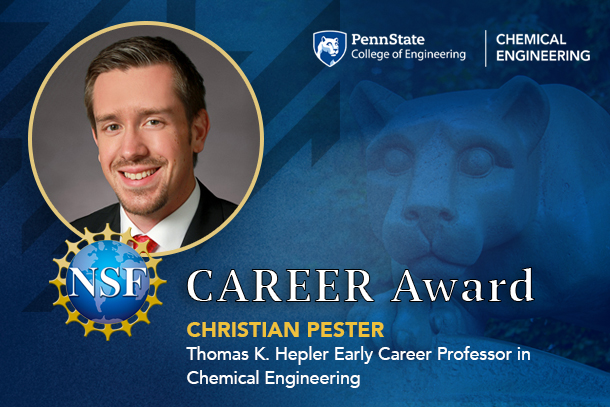
Christian Pester, Thomas K. Hepler Early Career Professor in Chemical Engineering at Penn State, earned a five-year, $500,000 NSF CAREER Award. Credit: Penn State.
2022 NSF CAREER Award: Christian Pester
2/28/2022
UNIVERSITY PARK, Pa. — Christian Pester, Thomas K. Hepler Early Career Professor in Chemical Engineering at Penn State, earned a five-year, $500,000 NSF CAREER Award for a project titled “Photocatalytic optical fibers.”
What do you want to understand or solve through this project?
We are trying to engineer new methods to improve how light can be used to drive chemical reactions. Both small and large molecules (polymers) can nowadays be synthesized by using photocatalysis and visible light. For this to work effectively, the photocatalysts themselves need to absorb light efficiently. This however inherently also limits how far light can reach into the reaction medium. Scalability becomes a challenge. Further compounding this challenge is that photocatalysts can be prohibitively expensive and residual catalyst impurities in the final products can lead to discoloration and degradation. With this award, my group and I are hoping to find ways to irradiate reactions more efficiently from the inside by using photocatalytic optical fibers. Because the photocatalyst is immobilized within the reactor (and not continuously added), it can be recycled for multiple reactions and the final product will be free of catalyst impurities — a condition necessary in many pharmaceutical and electronics chemical products. I am hopeful that the research of my exceptional students on this project will provide the fundamental engineering knowledge needed to translate advances in modern photochemistry to large-scale industrial application.
How will advances in this area impact society?
Because light can be collected freely or produced efficiently, driving chemical transformations with light (instead of heat) can provide significant advantages in synthetic chemistry. This project has the potential to accelerate the implementation of such modern and mild photochemistries on large scales and benefit society by helping to bridge the academia-industry divide. From an educational and outreach perspective, this program will broadly impact students of all ages and backgrounds by forming a coalition between university entities, rural schools, and industrial partners. We will increase interfaces between undergraduate and graduate students and potential employers through field trips and panel discussions with industry leadership. This program will also pilot and distribute inexpensive at-cost polymer science laboratory kits to secondary students to benefit underserved middle and high school students by improving their access to quality STEM education.
Will undergraduate or graduate students contribute to this research? How?
The graduate and undergraduate students I work with are the ones who deserve the real credit for their work on this project. They are the ones performing the actual research itself, and I am proud to be their adviser. Beyond the science, we will continue our efforts to promote inclusivity and diversity in STEM. As part of this project, undergraduate students will be recruited to develop laboratory kits on photochemistry and polymer science together with visiting teachers from rural Pennsylvania schools. With this, we hope to bring science closer to underrepresented and underserved groups, motivate the younger generations to consider and pursue a career in STEM, and hopefully help reduce the wealth gap that is ever expanding in the state and the nation. Students interested in participating in these opportunities should email me at pester@psu.edu.
The NSF CAREER Award not only funds a research project, but it also recognizes the potential of the recipient as a researcher, educator and leader in their field. How do you hope to fulfill that po-tential?
As a first-generation university graduate myself, I need to gratefully recognize the impact my mentors and teachers have had in my life. Similarly, the amazing students I get to work with daily give me deep appreciation for my role as an adviser and educator. Through our scientific findings we can impact the way things are done and function around us — yet the human interaction and growth of my students is what I value most about this profession. I am honored by this award and will continue my efforts to support them to the best of my abilities so they can accomplish their research, professional and personal goals.



